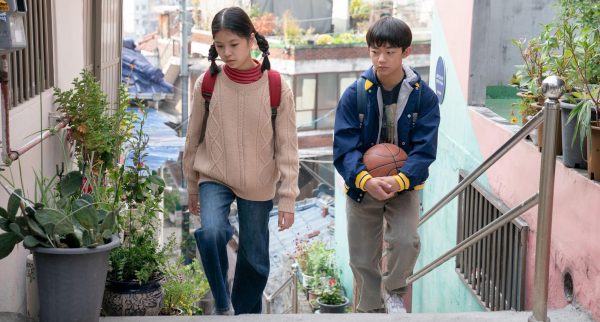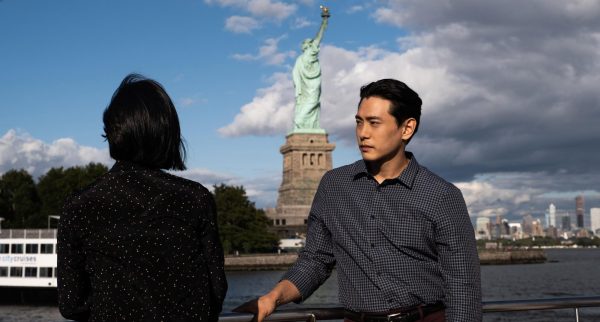★★★★☆ (Four stars)
Celine Song’s directorial debut “Past Lives,” is a powerful romance made for those who stay up at night haunted by the question of “what might have been.” Nora (Greta Lee) and Hae Sung (Teo Yoo) are best friends and first loves when an ocean tears them apart as Nora’s family emigrates from South Korea to Canada.

They depart with an awkward goodbye, neither wanting to go but not knowing how to stay. Nora leaves to the right and ventures up some stairs, while Hae Sung steers to the left and makes his way up the same steep on a hilled road. They are headed in the same direction on completely different paths. They will find this level of separation following them as they remain just barely out of reach for decades.
When Nora finds that Hae Sung is looking for her on her father’s Facebook page 12 years later, they begin talking frequently on Skype. Though reaching each other as widely different people, the pair find picking up where they left off to come with swift ease.
After struggling to build a real relationship an ocean away, the two lose touch once again. They go another 12 years with no contact until Hae Sung finally makes the trip to New York for a week. He visits with a now-married Nora in hopes of meeting the girl he once loved.
Song, an established New York playwright, based the film on a real-life experience where she translated a conversation back and forth between her American husband and Korean childhood sweetheart. With a successful career in theater, her triumphant entrance into film would not come as a surprise to those familiar with her work but nevertheless was an astounding first move into a new storytelling medium.
Song takes many of the usual romance tropes – a lost love, missed timelines and second chances – and showers them in the most beautifully painful fresh light. Saying goodbye to the life that could have been while finding peace in the one you have chosen is what makes the film so much more than your average romance.
“Past Lives” takes a look at the pieces of ourselves we leave behind with each other, and questions whether old lovers look back in search of a person or the version of ourselves we were with them. While Hae Sung and Nora find their lives inexplicably intertwined once more, audiences are left to wonder if turning to the past could ever result in a new future.
“Past Lives,” tells itself with full honesty, making the emotionally raw material all the more striking. Language and cultural barriers were portrayed with such realism. Every interaction between Hae Sung and Nora is spoken in Korean. While this feels like the very bare minimum, for a long time a film like this would not have had the outreach to become so popular. Until “Parasite” won Best Picture in 2019, subtitles in foreign language films did not do well in the American box office. There has since been a peak in subtitle acceptance among the general movie-goer. For this film, there would have been no other way to properly portray the bond that comes with speaking the same language, in every sense of the term.
The movie suggests an era where romance can be extended past the ideations we are accustomed to. Nothing in the movie felt too overboard, it is a quiet movie. Lee’s and Yoo’s performances relied heavily on their subtle facial expressions, learning to trust their characters and connect with all that is left unsaid becomes so easy with the talent these two display.

Visually the film is very neutral, shot on 35mm film; every frame leaves a lingering sense of nostalgia for what never has been. Song’s masterfully written script refuses to overly explain itself, its simplicity is the strongest tool in amplifying the slice-of-life format.
“Past Lives” is not a romance that aims to please its audience. Love rarely ties itself up nicely, often things will fade before we can get a good look at it, this film does not stray from reminding you of the fact. Leaving “Past Lives” with a dry eye feels unlikely, and exiting without a mind suddenly haunted by your own distant memories becomes near impossible.
Celine Song found a way for this film to connect with every person it passes, forcing audiences to brave what they want to ignore while doing so surrounded by art that will embrace the uncomfortable and wrap you up in its somber warmth.
















































































